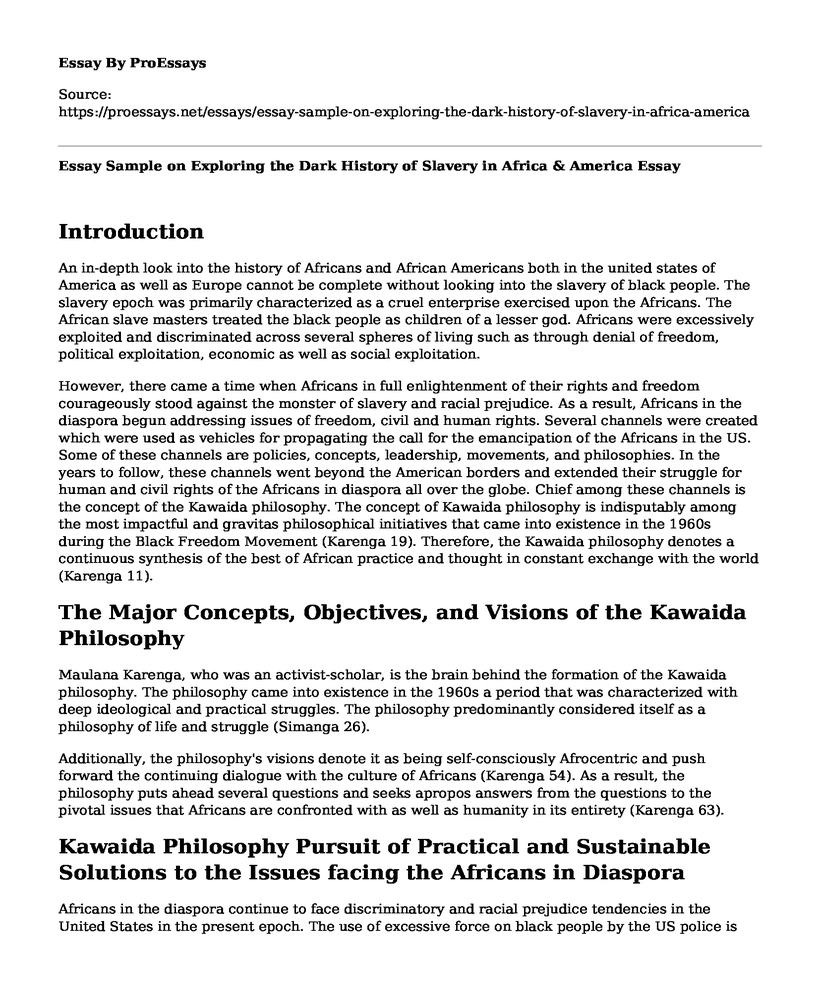Introduction
An in-depth look into the history of Africans and African Americans both in the united states of America as well as Europe cannot be complete without looking into the slavery of black people. The slavery epoch was primarily characterized as a cruel enterprise exercised upon the Africans. The African slave masters treated the black people as children of a lesser god. Africans were excessively exploited and discriminated across several spheres of living such as through denial of freedom, political exploitation, economic as well as social exploitation.
However, there came a time when Africans in full enlightenment of their rights and freedom courageously stood against the monster of slavery and racial prejudice. As a result, Africans in the diaspora begun addressing issues of freedom, civil and human rights. Several channels were created which were used as vehicles for propagating the call for the emancipation of the Africans in the US. Some of these channels are policies, concepts, leadership, movements, and philosophies. In the years to follow, these channels went beyond the American borders and extended their struggle for human and civil rights of the Africans in diaspora all over the globe. Chief among these channels is the concept of the Kawaida philosophy. The concept of Kawaida philosophy is indisputably among the most impactful and gravitas philosophical initiatives that came into existence in the 1960s during the Black Freedom Movement (Karenga 19). Therefore, the Kawaida philosophy denotes a continuous synthesis of the best of African practice and thought in constant exchange with the world (Karenga 11).
The Major Concepts, Objectives, and Visions of the Kawaida Philosophy
Maulana Karenga, who was an activist-scholar, is the brain behind the formation of the Kawaida philosophy. The philosophy came into existence in the 1960s a period that was characterized with deep ideological and practical struggles. The philosophy predominantly considered itself as a philosophy of life and struggle (Simanga 26).
Additionally, the philosophy's visions denote it as being self-consciously Afrocentric and push forward the continuing dialogue with the culture of Africans (Karenga 54). As a result, the philosophy puts ahead several questions and seeks apropos answers from the questions to the pivotal issues that Africans are confronted with as well as humanity in its entirety (Karenga 63).
Kawaida Philosophy Pursuit of Practical and Sustainable Solutions to the Issues facing the Africans in Diaspora
Africans in the diaspora continue to face discriminatory and racial prejudice tendencies in the United States in the present epoch. The use of excessive force on black people by the US police is one way that evidentially rubberstamps the presence of racial partiality of black people. To stop these practices, the Kawaida philosophy has come out publicly to confront the ill-treatment of the black population. The philosophy attempts to face racial discrimination by writing the history of black people. Also, apart from writing the African people history, black people should read it and the purpose of making it the interest and image of human and African flourishing and freedom (Simanga 38).
Furthermore, the philosophy provides solutions that are inclined on bringing about a collective life vocation and collective vision, love and struggle, a course of direction that reiterates the identity of the black people, provision of guidance and crafting of purposes for the Africans.
In winding up, therefore, the relatively high hostility levels faced by black people living in the US demand a collective vision as well as a collective vocation. This asserts the critical need to establish a foundation of philosophy that the black population will ground itself. The Kawaida philosophy is thus a platform for Africans in diaspora to assert and understand themselves globally, live their lives without interference, establish and nature their love, and soldier on with the righteous war of bringing to an end the oppression and crisis that Africans in diaspora are going through and in place construct a better world for everybody (Karenga 28).
Works Cited
Karenga, Maulana. "Nommo, Kawaida, and Communicative Practice." Understanding African American Rhetoric, 2014, pp. 3-22.
---. "Kawaida Philosophy." The International Encyclopedia of Intercultural Communication, 2017, pp. 1-6.
---. "Revisiting Brown, Reaffirming Black: Reflections on Race, Law, and Struggle." Handbook of Black Studies, pp. 165-184.
Simanga, Michael. "Revolutionary Kawaida." Amiri Baraka and the Congress of African People, 2015, pp. 85-92.
Cite this page
Essay Sample on Exploring the Dark History of Slavery in Africa & America. (2023, Jan 31). Retrieved from https://proessays.net/essays/essay-sample-on-exploring-the-dark-history-of-slavery-in-africa-america
If you are the original author of this essay and no longer wish to have it published on the ProEssays website, please click below to request its removal:
- Essay Example on American History Primary Source
- From First Contact to the Civil War Essay
- Ancient Roman History Essay Example
- Essay Sample on The Assassination of Franz Ferdinand
- Haiti Revolution: Slaves' Rebellion & Global Impact - Essay Sample
- Nat Turner: A Slave Rebellion Leader - Essay Sample
- Slavery: The Backbone of British Empire in America - Essay Sample







